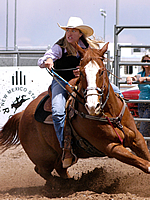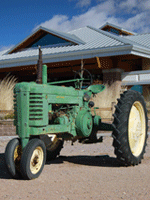
Solt, Betty SimsAbout | Story: Sexism in the Rodeo Arena | Abstract AboutThis interview provides background information and context for the interview recorded by George E. Sims in 1983 [in the Rio Grande Historical Collections, New Mexico State University, Las Cruces, N.M.]. The consultant's involvement in high school and college rodeo in the 1950s.
Story: Sexism in the Rodeo Arena
Jane O'Cain: Over time did you develop one particular event that you wanted to excel in? Betty Solt: I guess the breakaway roping was the main one that I liked. But then I guess I won more saddles and things in the barrel race. That was in college. High school, they didn't give a lot of big prizes in those days, you know. JO: So, high school years would have been what block of time? BS: From [19]51 through '54. (Overlapping voices.) Early '54. And then college from '55 through '58. Even then, in college, they didn't give the girls the same, the women the same as the men and now they do, exactly. I'm in the alum group, We have a National Intercollegiate Rodeo Association alumni group, and everything, and they give scholarships. If the boy gets a $5,000 scholarship, then the girl does, you know. Everything's equal. Saddles, everything, but not in my day they weren't (chuckles). JO: You attended university at... BS: At New Mexico A&M in those days. I know one year at Sul Ross [State University] Alpine[, Tex.], I won the All-Around Cowgirl. And the All-Around cowboy got this beautiful, hand-tooled saddle, and I got a $10 watch (laughs). I'll never forget that one. They just didn't do it. JO: So Title VII that came about in the [19]70s really was a boon to women, wasn't it? BS: Oh, I guess so. Abstract
Tape 1, Side A
George E. Sims, the consultant's father, was unable to complete his tape-recorded memoirs before his death on February 5, 1984. George E. Sims was born August 23, 1901 in Waxahacie, Tex. Solt's mother, Wahlecia Dell Blackwell, was also born in Texas on September 12, 1900. Solt's paternal grandparents, Edgar Thomas Sims and Harriet Hinds Sims, were the first generation to move to New Mexico. They homesteaded. The consultant's mother and her mother's brother came to New Mexico (May 1921). [A copy of the diary of their journey is retained in the files of the Farm & Ranch Heritage Museum Library.] They initially stayed with an uncle who had a mining claim in Pintada Canyon near Vaughn, New Mexico. Solt's mother met her father soon after her arrival and they were married October 12, 1922. Edgar and Harriet Sims' homestead was at Mesa de Leon. The homestead was eventually sold to the Paris ranch. Her grandparents had nine children; however two died in childhood-one to illness and the other was "drug to death by a cow." At the time Sims Solt's parents were married her father was working for the Moon Ranch. Soon after that he went to work for the Cabra Springs Ranch north of Newkirk, where he worked as a cowboy for several years. From there, George Sims went to work for the Charles Ilfeld Company where he worked directly for (Earl) Moulton at the Pastura Trading Company. Sims Solt lists her siblings' names and dates of birth. None of the five children (born 1926-1935) were born in a hospital. One of the midwives was Mrs. Boney of Pastura who, according to the consultant, was the inspiration for one the characters in Rudolph Anaya's book, &italBless Me, Ultima&ital. Mrs. Boney also provided babysitting for the family, the consultant relates an amusing anecdote of what happened one day while she was babysitting the children. The consultant states that her parents bought a home in Santa Rosa when she started school, she believes because the school in Pastura had closed or was closing. The family moved back to the ranch near Pastura when Solt was in junior high and high school, and she was able to drive herself to school. She describes her life on the ranch in the late 1940s and '50s. The sheepherders and shearers that were hired, the work the family did on the ranch, and living conditions on the various ranches where they lived (the first television she watched was in 1954 when she went to the university).
Tape 1, Side B
Solt continues describing life on the ranch: the types of meals they ate and housework. Sometimes her mother had assistance with housework, once from a local woman and during "the dust bowl" a woman, trained as a nurse, came and lived with the family and exchanged work for her board and room. She also states that her entire family, father and brothers included, did housework. She describes at some length their procuring their first bathtub, a step-up from the old tin washtub. She and her mother "got the first dip" followed by some of her brothers. Solt discusses the games she played with her brothers, giving details of imaginative play with readily available objects. They also had a natural lake in which to swim, horses to ride, and a sheep, Old Buck, who pulled them in a wagon. She did not often get to play with children from neighboring ranches. The Sims had good, neighborly relationships with other ranching families in the area. Not many of these ranching families are still in the business. Ranches are sold because of drought, but often to play inheritance taxes. Many of the new owners are absentee landlords. The consultant had a difficult time addressing the question of what the greatest hardship had been during her childhood years. She concludes, "I don't know if there were any hardships, really." The interview now focuses on her participation in high school and college rodeo. She entered her first rodeo in the seventh grade. She lists the events she entered, one of which is the "boot and cigar" race devised by one of her neighbors to provide another event for girls. Solt describes the boot and cigar race. In high school the consultant participated in the national female rodeo all four years (1951-1954). She liked breakaway roping, but won more prizes in the barrel race. During her years as a high school and college rodeo participant, girls and women were treated much differently than the boys and men. For example, in one college rodeo she won all-around cowgirl and was given a "$10 watch," while the all-around cowboy at the same time was given a "beautiful hand-tooled saddle." Solt attended New Mexico State University (then New Mexico A&M); they did support the women rodeo riders by paying mileage to rodeos, room and board while away from Las Cruces, and by providing a stall for their horses (if one was lucky enough to get one). The women paid their own entry fees and feed for their horses. They were not allowed to accept cash winnings as "that would make you professional and you couldn't compete." The consultant discusses the horses she performed with during her college career. One in particular, Sunny, was a very good horse; however it was merely loaned to her, and she wasn't able to afford to buy him after her college rodeo days were over. She did get her permit to enter the women's professional rodeo association, but there "wasn't much money involved in those days," and she had to quit and go to work.
Tape 2, Side A
Even today it is difficult for women to make a living on the pro-rodeo circuit. Events at women's rodeos, with the exception of barrel racing, which is featured at men's rodeos, do not pay "anywhere near what men get." She discusses some rough stock events that were held for women in the past. She met and interviewed (Alice and Margie) Greenough, two bronc riders from the early 1940s before women's "bronc riding ended." She describes traveling to college rodeos with two of her college friend. She also discusses other work she did during college, and activities such as participating in the wool judging team. She regrets that she and her two friends were unable to compete as members of the New Mexico State University rodeo team because "we would have won the national [college title] for New Mexico State [University] three years." |

